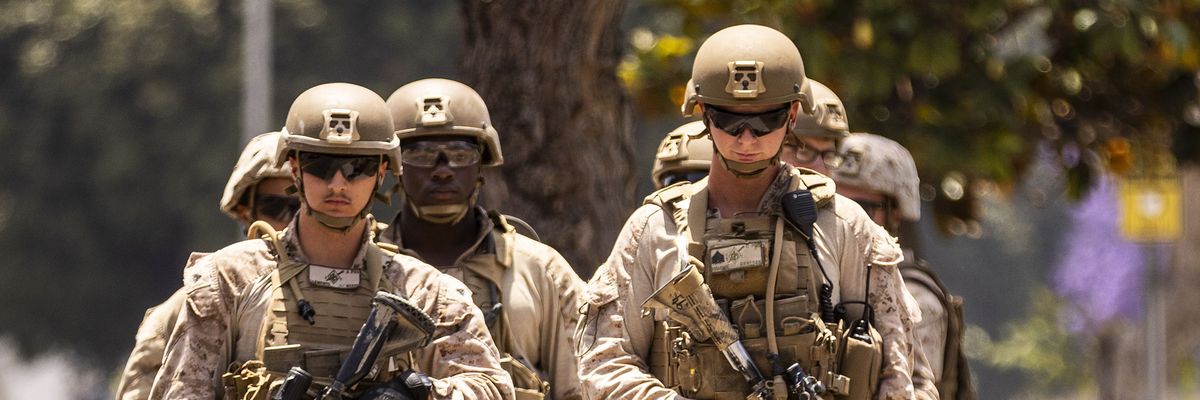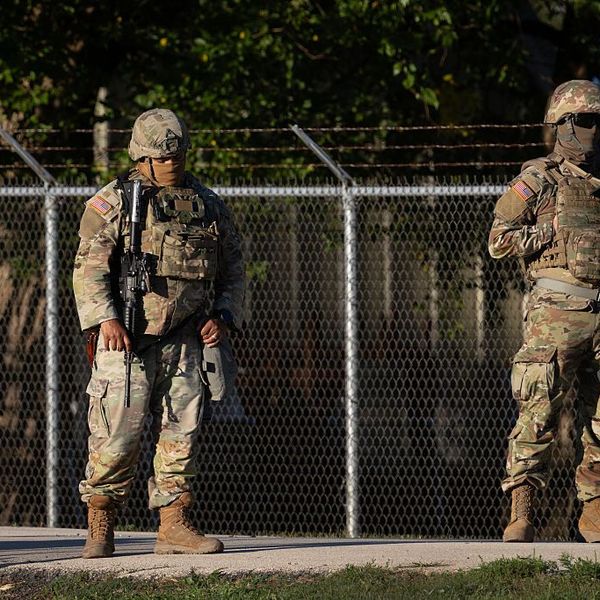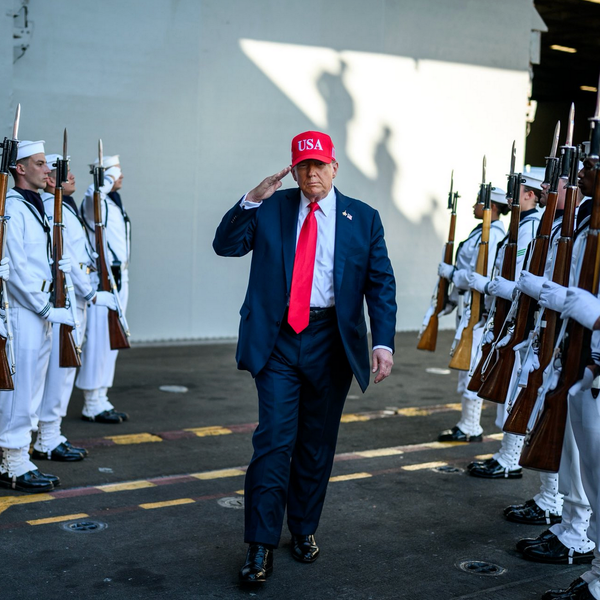
US Marines from 2nd Battalion, 7th Marines, 1st Marine Division walk to their assignment at the Wilshire Federal Building, ahead of nationwide "No Kings Day" protests, in Los Angeles, on June 13, 2025.
'Unlawful and Un-American': Trump Claims He Can Send 'Army, Navy, Air Force, Marines' Into US Cities
“Our military exists to defend the nation and protect our freedoms, not to be weaponized against American cities," said critics.
President Donald Trump alarmed many critics this week when he once again mused about deploying the military on the streets of US cities.
As reported by The New York Times, Trump told a group of American troops stationed in Japan on Tuesday that he could send the military into US cities under the pretense of fighting crime.
"We have cities that are troubled, we can’t have cities that are troubled," Trump said. "And we’re sending in our National Guard, and if we need more than the National Guard, we’ll send more than the National Guard, because we’re going to have safe cities."
Trump has deployed the National Guard to cities including Los Angeles, Chicago, Memphis, and Portland in recent months, but local and state officials have opposed the deployment in most cases and have filed legal challenges. Most recently, a federal appeals court voted on Tuesday to rehear the administration's case pushing to send the National Guard to Portland—vacating an earlier decision that allowed Trump to federalize Oregon's troops.
On Wednesday, Trump was asked by a New York Times reporter to specify what he meant when he said he could send "more than the National Guard" into American cities, and he replied that he could send any branch of the military he wanted without any oversight from courts or from Congress.
"If I want to enact a certain act, I'm allowed to do it," Trump said. "I'd be allowed to do whatever I want. The courts wouldn't get involved. Nobody would get involved. And I could send the Army, Navy, Air Force, Marines—I could send anybody I wanted."
Q: What did you mean last night when you said you were prepared to send 'more than the National Guard' into American cities?
TRUMP: Sure, I'd do that. As you know I'm allowed to do that
Q: Do you mean other branches of the military you'd send in?
TRUMP: If it were -- who are… pic.twitter.com/5O733Mas5V
— Aaron Rupar (@atrupar) October 29, 2025
The president threatened to invoke the Insurrection Act earlier this month, falsely claiming the law gives him "unquestioned power." The Insurrection Act allows presidents to deploy federal troops to enforce US laws in cases of extreme emergency, such as violent rebellions—but local officials in the cities Trump has targeted so far have categorically denied that anti-Trump protests there meet the high threshold for invoking the law.
The co-chairs of the Not Above the Law Coalition—Lisa Gilbert, co-president of Public Citizen; Praveen Fernandes, vice president of the Constitutional Accountability Center; Kelsey Herbert, campaign director at MoveOn; and Brett Edkins, managing director for policy and political affairs at Stand Up America—condemned Trump's threats on Tuesday as "unlawful and un-American."
"Our military exists to defend the nation and protect our freedoms, not to be weaponized against American cities," they said. "In his remarks today, Trump claimed that he and his administration cronies 'can do as we want to do.' That is as dangerous as it is unlawful and un-American."
Trump's use of the American military for domestic law enforcement purposes was also condemned by Ret. Maj. Gen. Randy Manner, a former top official at the National Guard.
Writing in the Home of the Brave newsletter, Manner condemned Trump's National Guard deployments to US cities as "un-American and wrong."
Manner noted that the National Guard has traditionally existed to augment US forces overseas during times of war, and also to serve at the request of state governors during times of emergencies. Using the National Guard to do standard police work, Manner added, is simply unprecedented.
"Our military is not trained in law enforcement," he argued. "There are absolutely zero situations where our National Guard should be on the streets of America as a status quo measure, absent some acute short-term crisis. We would never send our sheriff’s deputies to Afghanistan for a special operation; it’s just as illogical to send highly trained combat soldiers and put them into civilian law enforcement roles."
Trump first began musing about deploying the US military on American soil during the 2024 election campaign, when he said he could use it to take down a group of US citizens whom he described as "the enemy from within." Trump ratcheted up his threats last month when he told a group of assembled US generals that "we should use some of these dangerous cities as training grounds for our military."
An Urgent Message From Our Co-Founder
Dear Common Dreams reader, The U.S. is on a fast track to authoritarianism like nothing I've ever seen. Meanwhile, corporate news outlets are utterly capitulating to Trump, twisting their coverage to avoid drawing his ire while lining up to stuff cash in his pockets. That's why I believe that Common Dreams is doing the best and most consequential reporting that we've ever done. Our small but mighty team is a progressive reporting powerhouse, covering the news every day that the corporate media never will. Our mission has always been simple: To inform. To inspire. And to ignite change for the common good. Now here's the key piece that I want all our readers to understand: None of this would be possible without your financial support. That's not just some fundraising cliche. It's the absolute and literal truth. We don't accept corporate advertising and never will. We don't have a paywall because we don't think people should be blocked from critical news based on their ability to pay. Everything we do is funded by the donations of readers like you. Will you donate now to help power the nonprofit, independent reporting of Common Dreams? Thank you for being a vital member of our community. Together, we can keep independent journalism alive when it’s needed most. - Craig Brown, Co-founder |
President Donald Trump alarmed many critics this week when he once again mused about deploying the military on the streets of US cities.
As reported by The New York Times, Trump told a group of American troops stationed in Japan on Tuesday that he could send the military into US cities under the pretense of fighting crime.
"We have cities that are troubled, we can’t have cities that are troubled," Trump said. "And we’re sending in our National Guard, and if we need more than the National Guard, we’ll send more than the National Guard, because we’re going to have safe cities."
Trump has deployed the National Guard to cities including Los Angeles, Chicago, Memphis, and Portland in recent months, but local and state officials have opposed the deployment in most cases and have filed legal challenges. Most recently, a federal appeals court voted on Tuesday to rehear the administration's case pushing to send the National Guard to Portland—vacating an earlier decision that allowed Trump to federalize Oregon's troops.
On Wednesday, Trump was asked by a New York Times reporter to specify what he meant when he said he could send "more than the National Guard" into American cities, and he replied that he could send any branch of the military he wanted without any oversight from courts or from Congress.
"If I want to enact a certain act, I'm allowed to do it," Trump said. "I'd be allowed to do whatever I want. The courts wouldn't get involved. Nobody would get involved. And I could send the Army, Navy, Air Force, Marines—I could send anybody I wanted."
Q: What did you mean last night when you said you were prepared to send 'more than the National Guard' into American cities?
TRUMP: Sure, I'd do that. As you know I'm allowed to do that
Q: Do you mean other branches of the military you'd send in?
TRUMP: If it were -- who are… pic.twitter.com/5O733Mas5V
— Aaron Rupar (@atrupar) October 29, 2025
The president threatened to invoke the Insurrection Act earlier this month, falsely claiming the law gives him "unquestioned power." The Insurrection Act allows presidents to deploy federal troops to enforce US laws in cases of extreme emergency, such as violent rebellions—but local officials in the cities Trump has targeted so far have categorically denied that anti-Trump protests there meet the high threshold for invoking the law.
The co-chairs of the Not Above the Law Coalition—Lisa Gilbert, co-president of Public Citizen; Praveen Fernandes, vice president of the Constitutional Accountability Center; Kelsey Herbert, campaign director at MoveOn; and Brett Edkins, managing director for policy and political affairs at Stand Up America—condemned Trump's threats on Tuesday as "unlawful and un-American."
"Our military exists to defend the nation and protect our freedoms, not to be weaponized against American cities," they said. "In his remarks today, Trump claimed that he and his administration cronies 'can do as we want to do.' That is as dangerous as it is unlawful and un-American."
Trump's use of the American military for domestic law enforcement purposes was also condemned by Ret. Maj. Gen. Randy Manner, a former top official at the National Guard.
Writing in the Home of the Brave newsletter, Manner condemned Trump's National Guard deployments to US cities as "un-American and wrong."
Manner noted that the National Guard has traditionally existed to augment US forces overseas during times of war, and also to serve at the request of state governors during times of emergencies. Using the National Guard to do standard police work, Manner added, is simply unprecedented.
"Our military is not trained in law enforcement," he argued. "There are absolutely zero situations where our National Guard should be on the streets of America as a status quo measure, absent some acute short-term crisis. We would never send our sheriff’s deputies to Afghanistan for a special operation; it’s just as illogical to send highly trained combat soldiers and put them into civilian law enforcement roles."
Trump first began musing about deploying the US military on American soil during the 2024 election campaign, when he said he could use it to take down a group of US citizens whom he described as "the enemy from within." Trump ratcheted up his threats last month when he told a group of assembled US generals that "we should use some of these dangerous cities as training grounds for our military."
President Donald Trump alarmed many critics this week when he once again mused about deploying the military on the streets of US cities.
As reported by The New York Times, Trump told a group of American troops stationed in Japan on Tuesday that he could send the military into US cities under the pretense of fighting crime.
"We have cities that are troubled, we can’t have cities that are troubled," Trump said. "And we’re sending in our National Guard, and if we need more than the National Guard, we’ll send more than the National Guard, because we’re going to have safe cities."
Trump has deployed the National Guard to cities including Los Angeles, Chicago, Memphis, and Portland in recent months, but local and state officials have opposed the deployment in most cases and have filed legal challenges. Most recently, a federal appeals court voted on Tuesday to rehear the administration's case pushing to send the National Guard to Portland—vacating an earlier decision that allowed Trump to federalize Oregon's troops.
On Wednesday, Trump was asked by a New York Times reporter to specify what he meant when he said he could send "more than the National Guard" into American cities, and he replied that he could send any branch of the military he wanted without any oversight from courts or from Congress.
"If I want to enact a certain act, I'm allowed to do it," Trump said. "I'd be allowed to do whatever I want. The courts wouldn't get involved. Nobody would get involved. And I could send the Army, Navy, Air Force, Marines—I could send anybody I wanted."
Q: What did you mean last night when you said you were prepared to send 'more than the National Guard' into American cities?
TRUMP: Sure, I'd do that. As you know I'm allowed to do that
Q: Do you mean other branches of the military you'd send in?
TRUMP: If it were -- who are… pic.twitter.com/5O733Mas5V
— Aaron Rupar (@atrupar) October 29, 2025
The president threatened to invoke the Insurrection Act earlier this month, falsely claiming the law gives him "unquestioned power." The Insurrection Act allows presidents to deploy federal troops to enforce US laws in cases of extreme emergency, such as violent rebellions—but local officials in the cities Trump has targeted so far have categorically denied that anti-Trump protests there meet the high threshold for invoking the law.
The co-chairs of the Not Above the Law Coalition—Lisa Gilbert, co-president of Public Citizen; Praveen Fernandes, vice president of the Constitutional Accountability Center; Kelsey Herbert, campaign director at MoveOn; and Brett Edkins, managing director for policy and political affairs at Stand Up America—condemned Trump's threats on Tuesday as "unlawful and un-American."
"Our military exists to defend the nation and protect our freedoms, not to be weaponized against American cities," they said. "In his remarks today, Trump claimed that he and his administration cronies 'can do as we want to do.' That is as dangerous as it is unlawful and un-American."
Trump's use of the American military for domestic law enforcement purposes was also condemned by Ret. Maj. Gen. Randy Manner, a former top official at the National Guard.
Writing in the Home of the Brave newsletter, Manner condemned Trump's National Guard deployments to US cities as "un-American and wrong."
Manner noted that the National Guard has traditionally existed to augment US forces overseas during times of war, and also to serve at the request of state governors during times of emergencies. Using the National Guard to do standard police work, Manner added, is simply unprecedented.
"Our military is not trained in law enforcement," he argued. "There are absolutely zero situations where our National Guard should be on the streets of America as a status quo measure, absent some acute short-term crisis. We would never send our sheriff’s deputies to Afghanistan for a special operation; it’s just as illogical to send highly trained combat soldiers and put them into civilian law enforcement roles."
Trump first began musing about deploying the US military on American soil during the 2024 election campaign, when he said he could use it to take down a group of US citizens whom he described as "the enemy from within." Trump ratcheted up his threats last month when he told a group of assembled US generals that "we should use some of these dangerous cities as training grounds for our military."

